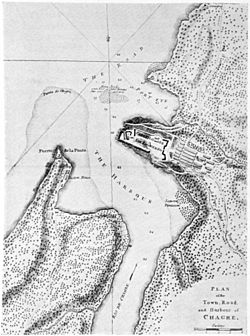Chagres
| Chagres | |
|---|---|
| Depopulated | |
![The current ruins of Fort San Lorenzo date from the 1750s.[1]](http://upload.wikimedia.org/wikipedia/commons/thumb/c/c8/Fort_San_Lorenzo_05.jpg/295px-Fort_San_Lorenzo_05.jpg)
The current ruins of Fort San Lorenzo date from the 1750s.
|
|
 Map of Chagres and Fort San Lorenzo in about 1739 |
|
| Location in Panama | |
| Coordinates: 9°19′20″N 80°00′10″W / 9.32222°N 80.00278°WCoordinates: 9°19′20″N 80°00′10″W / 9.32222°N 80.00278°W | |
| Country | Panama |
| Province | Colón |
| District | Chagres |
| Established | 1680s |
| Depopulated | 1916 |
| Fort San Lorenzo | |
|---|---|
| Fuerte de San Lorenzo, Castillo de San Lorenzo de Chagres |
|
| Chagres, Panama | |

Fort San Lorenzo. 2009
|
|
| Site history | |
| Built | 1587 - 1750 |
| Built by | Spain |
| Official name | Fortifications on the Caribbean Side of Panama: Portobelo-San Lorenzo |
| Type | Cultural |
| Criteria | i, iv |
| Designated | 1980 (4th session) |
| Reference no. | 135 |
| State Party | Panama |
| Region | Latin America and the Caribbean |
Chagres (Spanish pronunciation: [ˈtʃaɣɾes]), once the chief Atlantic port on the isthmus of Panama, is now an abandoned village at the historical site of Fort San Lorenzo (Spanish: Fuerte de San Lorenzo). The fort's ruins and the village site are located about 8 miles (13 km) west of Colón, on a promontory overlooking the mouth of the Chagres River.
In 1502, during his fourth and final voyage, Christopher Columbus discovered the Chagres River.
By 1534, the Monarchy of Spain had, following its conquest of Peru, established a rainy-season gold route over the isthmus of Panama—Las Cruces Trail—most of which consisted of the Chagres River. The trail connected the Pacific port of Panama City to the mouth of the Chagres, from whence Peru's plunder would sail to Spain's storehouses in the leading Atlantic ports of the isthmus: Nombre de Dios, at first; and, later, Portobelo. (The dry-season, overland route—the Camino Real—connected Panama City with those ports directly.)
Attracted to the treasure, pirates began attacking Panama's coast around 1560. To protect the Atlantic terminus of Las Cruces Trail, Spain built Fort San Lorenzo at the Chagres River's mouth. From 1587 to 1599, the fortifications evolved into a sea-level battery.
In 1670, buccaneer Henry Morgan ordered an attack that left Fort San Lorenzo in ruins. He invaded Panama City the following year, using San Lorenzo as his base of operations.
...
Wikipedia

